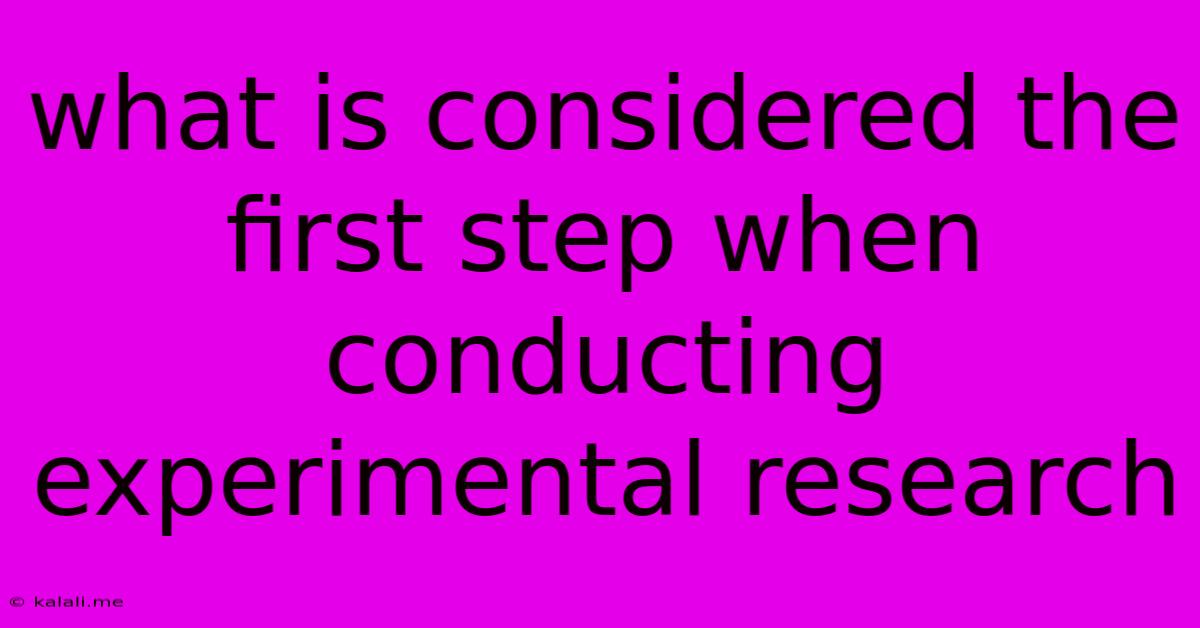What Is Considered The First Step When Conducting Experimental Research
Kalali
Jun 14, 2025 · 2 min read

Table of Contents
What is Considered the First Step When Conducting Experimental Research?
Defining the Research Question and Hypothesis Formation: The Cornerstone of Successful Experiments
Experimental research, a cornerstone of scientific inquiry, hinges on a meticulously planned process. While various methodologies exist, the very first step, and arguably the most crucial, is clearly defining the research question and formulating a testable hypothesis. This seemingly simple step lays the foundation for the entire experiment, determining its design, methodology, and ultimately, the validity of its conclusions. Without a well-defined question and a corresponding hypothesis, the experimental process becomes haphazard and prone to yielding inconclusive or even misleading results.
This initial phase involves several key considerations:
- Identifying a Research Gap: Begin by thoroughly reviewing existing literature. What knowledge gaps exist in your field? What unanswered questions remain? A strong research question addresses a specific gap and contributes meaningfully to the existing body of knowledge.
- Formulating a Testable Hypothesis: Once a research question is established, a testable hypothesis needs to be formulated. A hypothesis is a tentative, specific, and testable statement about the relationship between two or more variables. It should clearly articulate the predicted outcome of the experiment. A good hypothesis should be falsifiable; meaning it's possible to design an experiment that could prove it wrong. This is key to the scientific method.
- Defining Variables: This involves identifying the independent variable (the factor being manipulated), the dependent variable (the factor being measured), and any potential confounding variables (factors that could influence the results). Clearly defining these variables is crucial for designing a robust experiment that minimizes bias and maximizes internal validity.
Beyond the Hypothesis: Essential Preliminary Considerations
While hypothesis formation is paramount, several other preliminary considerations are vital before moving to the next experimental stage:
- Literature Review: A comprehensive literature review is crucial. It provides context for the research question, identifies relevant methodologies, and helps refine the hypothesis.
- Ethical Considerations: Especially in research involving human or animal subjects, ethical considerations must be addressed upfront. This includes obtaining necessary approvals from Institutional Review Boards (IRBs) and ensuring the welfare of participants. Ethical considerations should guide every aspect of the experimental design.
- Resource Allocation and Feasibility: A realistic assessment of available resources (time, budget, equipment, personnel) is necessary. The experiment should be feasible within the given constraints. A carefully designed experiment avoids unnecessary complexity and focuses on achieving its objectives effectively.
In Conclusion:
The first step in experimental research is not about designing the experiment itself, but rather about formulating a strong, focused research question and a testable hypothesis. This crucial initial step sets the stage for a well-designed, ethical, and ultimately successful experiment that can contribute meaningfully to the field. Thorough preparation in this phase saves significant time and resources down the line and increases the likelihood of obtaining reliable and valid results. Neglecting this foundational aspect will almost certainly compromise the entire research endeavor.
Latest Posts
Latest Posts
-
Which Of The Following Are Financial Statements
Jun 15, 2025
-
Which Of The Following Is Not True About Vitamins
Jun 15, 2025
-
Distance Covered Per Unit Of Time
Jun 15, 2025
-
What Is The Gpa Requirement For Lsu
Jun 15, 2025
-
Difference Between Agreement And Memorandum Of Understanding
Jun 15, 2025
Related Post
Thank you for visiting our website which covers about What Is Considered The First Step When Conducting Experimental Research . We hope the information provided has been useful to you. Feel free to contact us if you have any questions or need further assistance. See you next time and don't miss to bookmark.